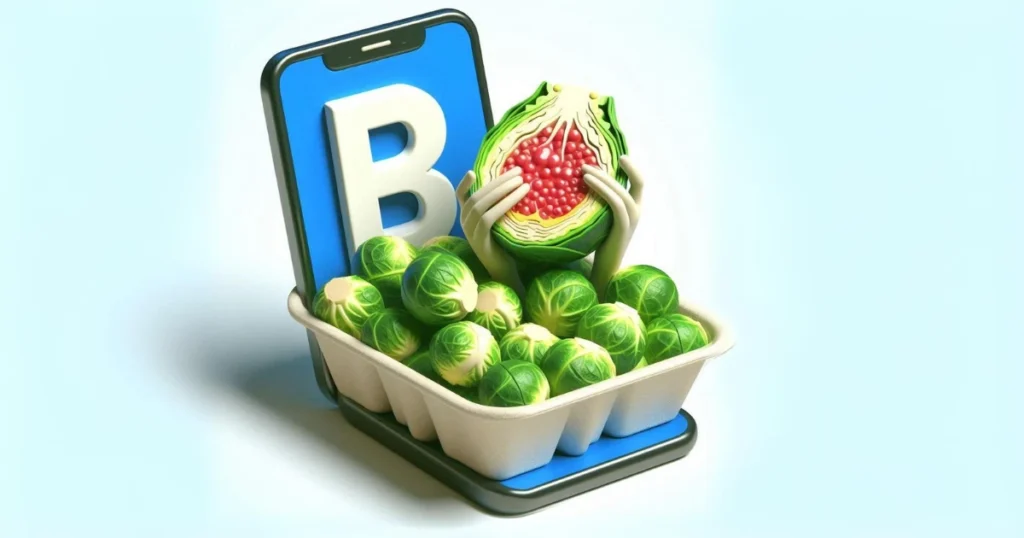
Brussels sprouts belong to the Brassicaceae vegetable family, which also includes kale, cauliflower, and mustard greens.
We normally slice, wash, and cook these cruciferous vegetables, which resemble little cabbages, to serve as a healthy side dish or main course.
This article explores eight ways Brussels sprouts might enhance your health.
1. High in nutrients
Brussels sprouts provide few calories but are high in fiber, vitamins, and minerals.
Here are some of the most important nutrients in 1/2 cup (78 grams) of cooked Brussels sprouts:
- Calories: 28
- Protein: 2 grams
- Carbs: 5.5 grams
- Fiber: 2 grams
- Vitamin K: 91% of the Daily Value (DV)
- Vitamin C: 53% of the DV
- Folate: 12% of the DV
Brussels sprouts are particularly high in vitamin K, which is essential for blood clotting and bone health.
They are also high in vitamin C, an antioxidant that aids in iron absorption, tissue repair, and immunological function.
Furthermore, their high fiber content promotes digestive health and regularity.
Apart from the minerals mentioned previously, Brussels sprouts also provide minor quantities of vitamin B6, potassium, iron, thiamine, magnesium, and phosphorus.
2. High in fiber
Just 1/2 cup of cooked Brussels sprouts has 2 grams of fiber.
Fiber is essential for your health, and having a sufficient amount in your diet provides numerous health benefits.
According to research, dietary fiber can help with constipation by increasing stool frequency and softening stool consistency, allowing for easier passage.
Numerous health benefits, including a lower risk of heart disease, have also been associated with increased fiber intake.
According to current guidelines, the recommended daily intake is 14 grams of fiber for every 1,000 calories consumed. For example, someone who needs 2,000 calories per day should consume 28 grams of fiber.
Eating Brussels sprouts alongside other high-fiber foods such as vegetables, fruits, and whole grains might help you achieve your fiber requirements.
3. Rich in antioxidants.
Brussels sprouts provide numerous health benefits, but their high antioxidant content stands out.
Brussels sprouts are abundant in antioxidants, which boost overall health and protect cells from injury.
Eating Brussels sprouts as part of a fruit and vegetable-rich diet will help your body acquire the antioxidants it needs to be healthy.
4. Maintain blood sugar levels
In addition to their outstanding nutritional profile and long list of health advantages, Brussels sprouts may help regulate blood sugar levels.
Multiple studies have indicated that consuming more cruciferous vegetables, especially Brussels sprouts, is associated with a lower risk of diabetes.
This is most likely due to Brussels sprouts’ high fiber content, which helps manage blood sugar levels.
Increasing your intake of Brussels sprouts while maintaining an otherwise healthy diet may help keep your blood sugar constant.
5. High in Vitamin C.
Brussels sprouts contain 48 milligrams of vitamin C per cooked 1/2 cup.
Vitamin C is essential for bodily tissue growth and repair. It also serves as an antioxidant, aids in the formation of proteins such as collagen, and may boost immunity.
Vitamin C can also help you absorb non-heme iron, a type of iron present in plant foods. This sort of iron is more difficult for your body to absorb than iron from animal sources.
Numerous fruits and vegetables are rich in vitamin C; however, Brussels sprouts stand out as one of the top vegetable sources.
Incorporating Brussels sprouts into your meals a couple of times per week can contribute to meeting your vitamin C quota.
6. May reduce inflammation
Inflammation is a common immune response, although chronic inflammation has the ability to lead to diseases like cancer, diabetes, and heart disease.
As mentioned earlier, Brussels sprouts are high in antioxidants, which can help neutralize the free radicals that can promote inflammation.
A diet rich in cruciferous vegetables, such as Brussels sprouts, may reduce inflammation and the risk of pro-inflammatory diseases.
7. Simple to incorporate into your diet.
Brussels sprouts make a healthy addition to any diet and are simple to incorporate into side dishes and entrees.
People frequently find pleasure in consuming them roasted, boiled, sauteed, or baked.
For a straightforward side dish, start by trimming the ends of the Brussels sprouts. Combine the sprouts with a small amount of olive oil, salt, and pepper, then bake them on a baking sheet until they become crispy.
Additionally, you can incorporate Brussels sprouts into pasta dishes, frittatas, or stir-fries to create a tasty and healthy dinner.
Tips for buying Brussels sprouts
Brussels sprouts are available year-round in most grocery shops’ fresh produce sections.
When harvesting Brussels sprouts, avoid those that are soft or turning yellow. Instead, use crisp, vivid green Brussels sprouts. It is permissible to keep them in the fridge for a week.
The bottom line
Brussels sprouts are high in fiber, vitamins, minerals, and antioxidants, so they are a healthy addition to your diet.
They may also provide additional health benefits, such as reduced inflammation and enhanced immune system function.
Including Brussels sprouts in a balanced diet rich in fruits, vegetables, and whole grains has the potential to significantly improve your health.


